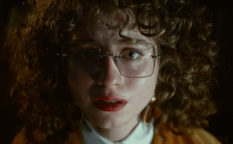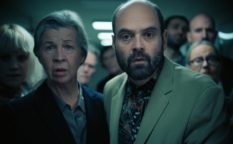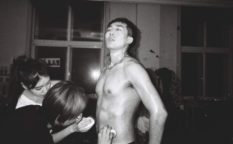Lubna Playoust: “Both acting and directing move me, and I feel home there.”
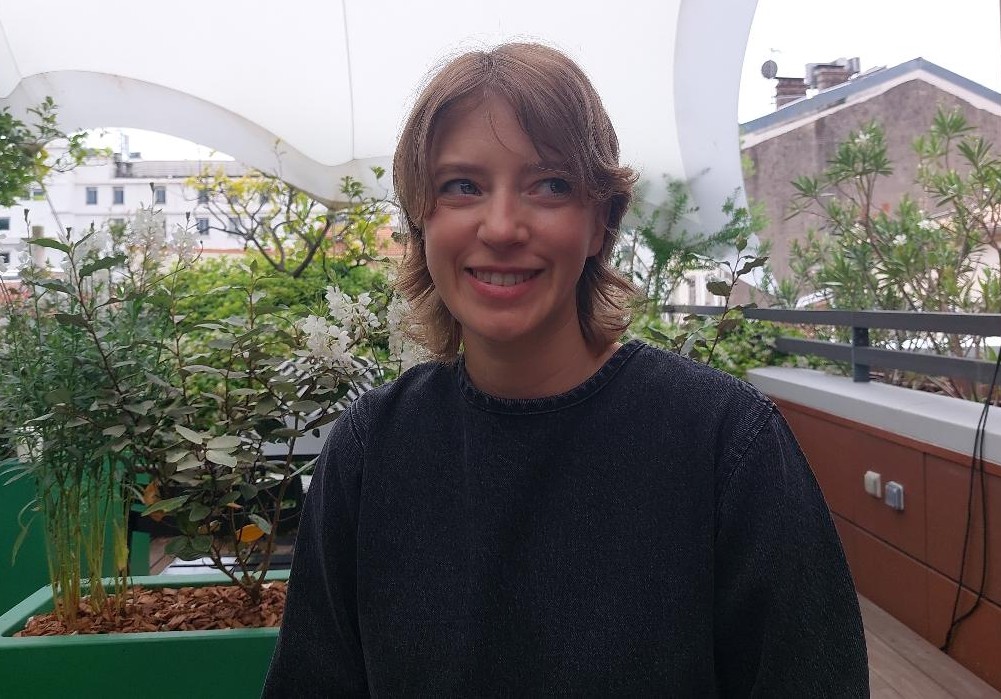
Photo ©Marina D. Richter
French actress Lubna Playoust came to Cannes with her first feature documentary Room 999, a reaction to Wim Wenders Room 666 from 1982, that screened in the Classics program of the festival. Applying the same formula as her big influence, Playoust confronted 15 filmmakers during the Cannes film festival in 2022 with the same question as Wenders did 40 years ago: “Is cinema a language about to get lost, an art about to die?”, getting very mixed responses to it.
A former student of Abbas Kiarostami and Lucrecial Martel, Playoust is developing her own cinematographic language one should keep under the radar. Her film is a welcome exploration of the current state of things in the film industry, and a clever follow-up to Wenders’ original.
Ubiquarian met Playoust at the Unifrance terrace in Cannes, shortly after the movie’s world premiere to find out more about her motives to continue in the footsteps of Wenders, her big inspiration and new-found mentor.
Did your urge to make Room 999 come from the need to explore the state of the industry you are tightly connected to as an actress, and because you feel threatened by the current state of things, or did it come from the pure curiosity?
Before I knew where I was with this question or potential answers, I had to wait a moment and come in discussion with all directors involved in the project because they were much longer in the film business. But I also wanted to unite the maximum of filmmakers and to ask them what they think about the topic that gained even more on relevance today, to find out how I feel about all of it. We are regularly bombed with information about the precarious situation of the film industry. I kind of needed to find out what’s the current state of things. The other thing is that I am a baby filmmaker who is currently working on my first fiction movie. So starting this career by questioning filmmaking and the whole industry was a good way to set the foundation of my work, and to hear what the people have to say, and hear little voices in my head telling me the words of wisdom. I firstly needed to take them in for me and greet the filmmakers that I admire, to address the question and make all of it into a film for the others, and not just for me.
I guess that you had to plan the project for a long time in order to make everything ready for the 75th edition of the Cannes Film Festival. What was the filmmakers’ reaction when you invited them to participate in the movie?
The reactions came when I started welcoming them in the room. Some of them knew what they were going to do, and some were stressed out by the mad tempo between the screenings, meetings and interviews, and they didn’t immediately realize where they were. So, the most important moment was when they understood what was going on, and discovered the question and the nature of the project that we were doing. I discovered that many of them were quite scared of facing that topic in front of the camera. That was when I realised what kind of important tool the camera was, and that they also were aware of it and played with its possibilities in very different ways. So, my approach was simple. Sometimes we would send them a leaflet, and sometimes I would run into someone by chance in a screening, or on the street, so I had to be able to be open and flexible during the festival, and dance the balet set to the Cannes tunes.
Have you tried to reach some of the filmmakers before the festival kicked off?
A few, because we had a list prepared. We looked at the schedule of Cannes and the programme, and selected as many as we could, paying attention to diversity. There were many who were not planned, but who came aboard because we met during the festival.
The words of two filmmakers stick to my mind, and I think that I can even repeat word to word what they said: Nadav Lapid and Alice Rorwacher. Can you pick anyone who particularly touched you with their thoughts about the current state of things?
I wasn’t checking on the footage during the shooting and I’ve got to say that every time I was watching it, I discovered very different layers. My first impression was positive. I couldn’t judge anyone and make verdicts about the way someone acted or spoke in front of the camera. I was really wondering how everybody was analysing their thoughts surrounding this question. Obviously, the movie begins and ends with Wim Wenders, not only because I love him and he really moves me, but because he generally awakes something in lot of people’s hearts. He was really someone who was doing everything well, as I was sure he would. Alice speaks very personally and at the same time she is aware of the world she lives in. I also like Nadav Lapid very much since he has a very wise and interesting way of putting things into perspective. There were lots of different personalities speaking in front of the lense. Some maybe seem like dancing around the question, and a few look a bit distant. At the beginning, I was expecting that everyone will be talking about the art of the cinema, but gradually I realized that there were pressing questions regarding the industry itself. Then I became scared that we will start talking about Covid-19, but it was all about filmmaking. Also, what was funny is that all filmmakers somehow looked the same way as their films.
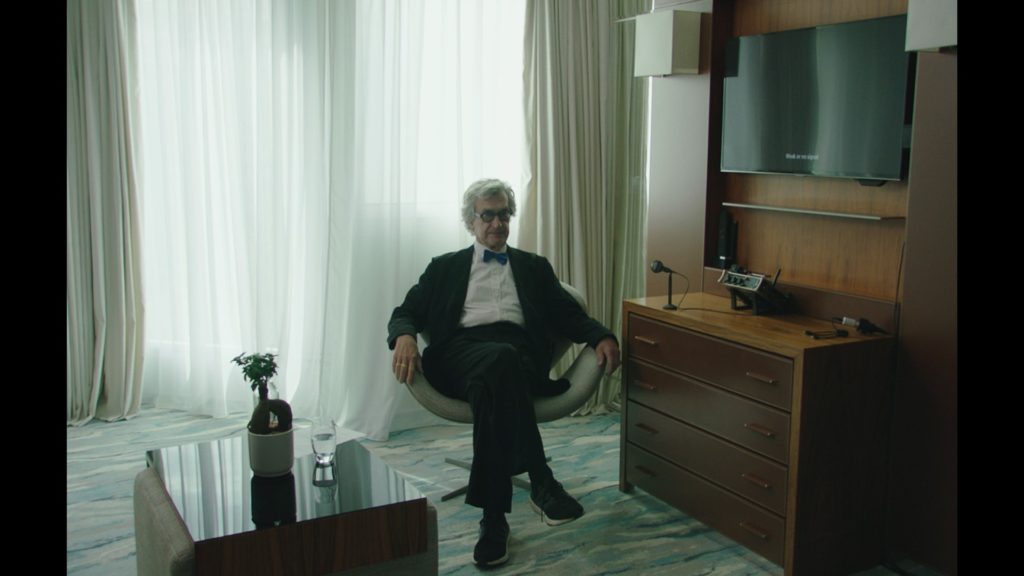
Ruben Östlund made a funny compairson between streaming platforms and his all-inclusive holiday experience.
Exactly, and that’s because he’s really aware of the current situation and wants to make people think about it. He is a giving person, and you can feel that he has a lot of faith in the cinema. Albert Serra made me laugh, and Claire Denis moved me a lot, so did Joachim Trier, because he represents a young generation. Davy Chou as well. I didn’t only get the answers, but the personalities of each one of them as well. What they gave me, and the way they expressed themselves, but also how they used the space was very generous.
I have to go back to your statement that all of the filmmakers reflected something of their film dynamics in a way they spoke in front of the camera. A classical example is Baz Luhrman pacing up and down the romm, not in a nervous, but hectic way.
He was very aware of his image, impressive and passionate in what he said.
I have an interperetation of the movie’s title, so let me begin with it. I am curious if I am any near the real reason you chose it. Did you intentionally flip the number 666 to express a more optimistic view of the future of the cinema?
I don’t think that is necessarily the question of optimism, which I also clearly address in the film. It is wrong to claim that everything will be just fine. Yes, something is dying and is maybe not going in the direction we would like it to go. But, at the same time, it’s the way things are and we can try to embrace them. We can use changes to make strong choices and to question ourselves. With 999 is more of a case where I wanted to find a meaningfull title. With 666 Wim Wenders managed to bring over his message. It was a perfect title that opened a door to conversations. But what actually happened is that I discovered the meaning of humber 999 in numerology which stands for a new start. It signifies the beginning of a new era. With 666 we know that we have to balance between life & death. It is fragile although it represents another kind of power.
Very strong part of the movie is right at the beginning, when shortly after Wim Wenders’ introduction, we get transported to your voice-over and the story about the Lebanese cedar tree that he shot in his documentary, outside of the airport in Paris on his way to Cannes in 1982. Did you go there to see if the tree was still standing, or did you already know that it was cut down?
While I was preparing the material for the film, I was making decisions about which parts of the original I wanted to keep. I knew that at some point I wanted to use the story about that tree as the silent witness of the birth of the cinema, so I was curious to see what happened to it. Making a film is entering a quest. Every element that I was trying to re-create was an answer to what has changed over past 40 years. I told Wenders about my wish to go and see the tree, and when we finally went there and discovered that it was cut, I was unsure what to do. The question arised if I should really go and shoot a dead tree, but I did it not in order to prove that something was dying. I wasn’t interested in such form of analyses and saying: “that means this and that”. Dead is not dead, because everything and anyone that dies nurtures the nature. Still, it was a good way to describe the state of things now. Something was gone, so what do we do with it? That was also the most crucial question standing in the air during the shooting of my documentary.
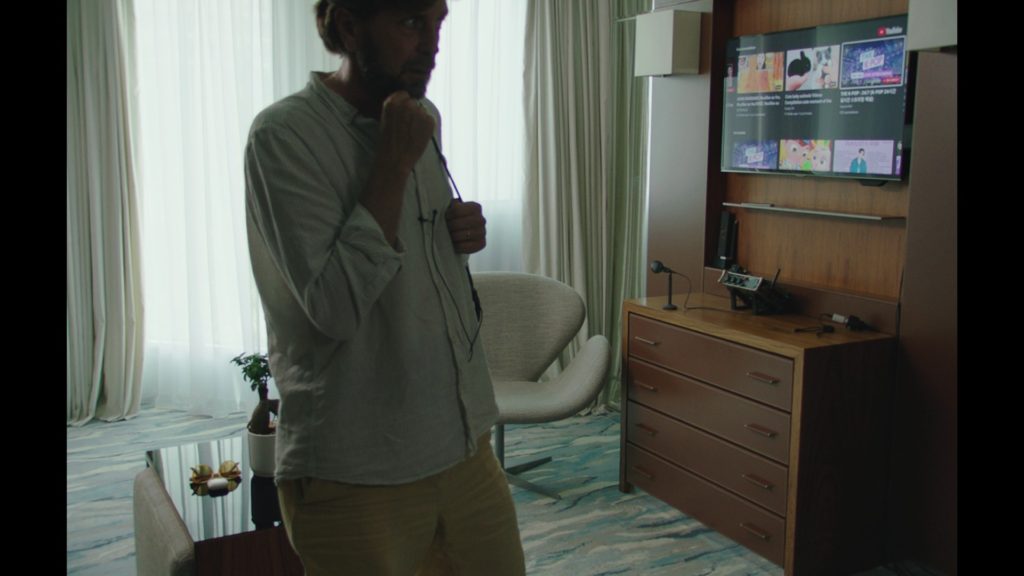
Let’s turn to the setting. Of course, there are many similarities to the original: the way the chair is positioned in the room, and a TV set (on) to the left-hand side of the interviewees, a heavy curtain that releases a discreet ammount of light in the hotel room…
I already knew what I was going to do even before we started shooting in terms what I was going to keep from Wenders’ original, and what not. TV served to show the time lapse, but shooting in the same hotel wasn’t something that I considered important. On the other hand, the imigery of the hotel room was. Regarding the TV set, in previous time, it was the small, robust thing placed on the top of a cupboard, and nowadays it is a huge thing attached to the wall, flying in the air. Also, when you switch the channels you have the question of rights which shows what the telly is nowadays: a platform with an incredible ammount of choices. I needed to keep that as an element. Also the wide frame, just to be able to compare the original with my film. It was a good choice because people could move, interact and even leave without breaking the charm of the image. Additionally, all filmmakers were somehow on the same level.
At the beginning of the production I was asked if I was sure to do things that way. Even Wim Wenders asked that question, because I wasn’t able to have a monitor out of technical reasons. I decided that it was a good idea to do things the way, I imagined because poeple wouldn’t feel checked on and watched, and they would be free to react and interact freely.
The question surrounding the presence or absence of monitor was Wenders’ first question before he started talking.
Yes, exactly. He had everything checked in a way, but I made it clear from the start that there will be no one in the room. I felt that people are more free to go into psychoanalyses when there is nobody standing in front of them with the camera.
We worked with Marie Atlan who is an amazing director of photography. We found an ideal frame which continued the intention of Agnes Godard who was behind the camera in “Room 666”. We set it up, and we didn’t touch it throghout the shooting. I would enter the room and explain each time to every single filmmaker how the process was going to go. They had exactly the same question as Wim Wenders asked his 15 colleagues back in 1982. All of them accepted the way things were, and only afterwards we started discovering what we had by watching the material during the editing.
You are a professional actress who found big passion for filmmaking in 2014. You directed two short films, and now with your first feature you are in the Cannes Classics segment of the festival. Are you equally comfortable in front and behind the camera?
When I went into acting, I was in a very strange period of my life. I found it relieveing, as I could express a lot of things I couldn’t do in my ‘real’ life. I was in chaos, and being able to slip into other characters’ skin was very helpful. When I discovered that I could write and shoot other stories, that became even more overwhelming. Just before Room 999, I shot another short with my son starring next to me which was enormously important to understand how to work with actors. I am coming back to the previously mentioned duality of being fragile and strong at the same time. Both acting and directing move me, and I feel home there.
You are currently working on your new film. Could you give us a spolier or two?
It’s a coming of age story about an 11-year-old girl in Paris chasing her dad. It’s also a tribute to nightlife, because I care a lot about what we are doing in the night time. The humanity is traditionally scared of darkness, which is related to our inner fears of the mysterious, not totally transparent part of our lives. The film is also about freedom.














